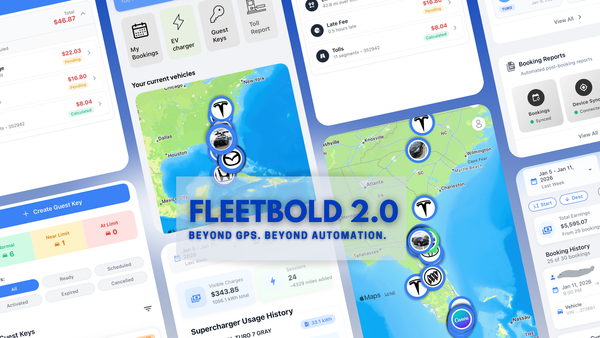Tint & ABI as Off Trip Rental Insurance: What Turo Hosts Need to Know
Off trip insurance is essential for Turo hosts to protect vehicles during periods of downtime. Learn how Tint and ABI can offer the right coverage for your fleet and save on costs.

Introduction: Why Off Trip Insurance is Crucial for Turo Hosts
As a car rental business owner, particularly one involved with car sharing platforms like Turo, it’s important to consider off trip insurance to ensure comprehensive coverage for your fleet. While traditional rental coverage applies only during active bookings, it leaves gaps when the vehicle is not rented but still requires protection. Off trip insurance helps fill these gaps by offering protection during periods when your cars are not being rented but still in use or sitting idle.
Off trip insurance is a form of additional coverage that ensures your vehicles are protected in situations that fall outside the scope of standard rental insurance policies. Turo’s insurance covers active bookings, but what happens during the periods when your car is not actively rented out? Whether it’s parked in your driveway, being used for personal errands, or undergoing maintenance, these off trip periods leave your vehicles vulnerable.
Off trip insurance provides peace of mind by covering vehicles during personal errands, maintenance, or downtime. Without it, hosts can face considerable risks when a vehicle isn’t actively rented, including liability for damage or accidents that may occur during those off periods. Additionally, it can be a more cost effective solution compared to traditional personal or commercial insurance policies, especially if you manage multiple vehicles.
In this article, we’ll explore why off trip insurance matters, compare providers like Tint and ABI, and offer insights into how to select the right coverage for your business.
Why Off Trip Insurance Matters
Off trip insurance is a critical aspect for Turo hosts who want to ensure that their vehicles are adequately protected during times when they are not actively rented out. While Turo’s primary insurance coverage applies only during active bookings, it’s important to look at the bigger picture for your fleet.
Protection Beyond Reservations
Turo's traditional coverage is designed to protect your vehicle during active bookings, but what happens when your car isn’t rented out? Whether it’s parked in your driveway, used for personal errands, or undergoing maintenance, these off trip periods are unprotected under Turo’s primary coverage. Without additional insurance, you could be liable for damage, accidents, or theft during this time.
The risk here is significant, as you could be exposed to liability for incidents that happen when the vehicle isn’t actively on a rental. A guest might be responsible for damage during their booking, but as soon as they return the car and the booking ends, you, as the host, take on the responsibility during the off trip period. Off trip insurance helps bridge this gap, providing liability coverage and protection against physical damage when the car is not in use for rentals. This protection is essential for minimizing unexpected costs and ensuring your vehicles remain fully covered, even when not actively rented out.
Having off trip insurance is like having an umbrella that covers every time your vehicle is off the clock, whether it's parked or being used for errands. Without it, you would face risks of having to pay for any incidents out of pocket.
Cost Management
Cost is one of the most significant advantages of off trip insurance. Some insurers offer better rates than standard personal or commercial policies, especially for hosts with multiple vehicles. Traditional policies can quickly become expensive for fleet owners, particularly if they are insuring several cars simultaneously.
For fleet owners, the financial burden of maintaining traditional personal or commercial insurance policies can add up quickly. Off trip insurance, on the other hand, often provides more flexible, affordable solutions. Depending on your fleet size and business needs, you may find that off trip insurance offers better rates for vehicles that are occasionally off the rental market. This can significantly reduce the overall cost of insurance for your fleet.
For instance, if you have several cars in your fleet, getting off trip insurance could allow you to manage the costs better, compared to insuring each vehicle individually under a personal or commercial policy. This not only saves you money but ensures that your vehicles are always covered, regardless of whether they’re being rented out or not.
Additionally, the rates for off trip insurance can be more predictable. While personal or commercial policies might increase unexpectedly based on factors like geographic location, off trip insurance typically offers more stable premiums, making it easier for hosts to budget for long term coverage.
Host Flexibility
Off trip insurance provides hosts with the flexibility they need to manage their fleets without having to worry about sudden, unforeseen risks. With traditional rental coverage, hosts are restricted by when their vehicles can be off market or used for personal purposes. This can be a significant challenge, particularly if you need to take your cars out of circulation for maintenance, repair, or personal use.
With off trip insurance, Turo hosts can plan vehicle maintenance or take cars off the market for personal use without sacrificing liability protection. If a car is not actively rented but still requires comprehensive insurance, having off trip coverage allows hosts to operate with greater flexibility. This flexibility is essential for planning downtime or handling unexpected situations, like needing a vehicle for personal use or handling repairs without worrying about the vehicle being unprotected.
This type of coverage ensures that hosts are not exposed to risks when their vehicles are in transit for maintenance or personal errands. The added flexibility of off trip coverage can be crucial in managing downtime or handling unexpected events that may take a car off the rental market temporarily.
Comparing Tint and ABI
When considering off trip insurance, it’s important to compare providers like Tint and ABI, as each offers unique benefits and coverage details that may suit your fleet’s needs differently.
Minimum Vehicle Requirements
Each insurer has its own requirements when it comes to fleet size. Some insurers may not accept smaller fleets unless you meet a minimum threshold of vehicles. For example, Tint might require a fleet of at least three cars before they offer coverage. If you're operating a smaller fleet, it’s essential to verify the eligibility criteria with each provider to determine whether they fit your business needs.
The scale of your business can have a direct effect on the cost and accessibility of coverage. If you're just starting with a small fleet, you may need to look at providers that cater to smaller operations to avoid unnecessary expenses.
Data Sharing Concerns
As with any insurance policy, there can be concerns about data sharing, particularly when it comes to using a car sharing platform like Turo. Many hosts are concerned about how their data will be shared with insurance providers and how this might affect their premiums or lead to additional fees.
Understanding how data flows between Turo and the insurance provider is essential for making informed decisions about coverage. Some insurers may have access to vehicle usage data or rental information, which could affect the pricing or terms of your policy. Make sure to discuss data sharing policies with your insurer and Turo to avoid surprises when it comes to your coverage.
Having transparency about how your data is used will give you the ability to choose providers that offer the most competitive terms based on your vehicle usage patterns.
Premium Adjustments
Like all insurance products, rates for off trip insurance can fluctuate. Rate increases can occur due to broader underwriting changes, regional risks, or adjustments in Turo’s policies. It’s essential to review your policy regularly and make sure the terms and premiums align with your current business strategy.
For instance, if your fleet size changes or if there’s a significant shift in your business model, reviewing your policy with your insurer ensures you're not paying for unnecessary coverage. Regular evaluations also help you avoid paying higher premiums due to changing market conditions or insurer rate increases.
Reviewing your insurance policy annually or whenever your fleet grows is essential in keeping premiums in check while ensuring you have the right amount of coverage for your needs.
Key Considerations for Turo Hosts
Evaluate Your Fleet Size
The size of your fleet can have a significant impact on the cost and accessibility of off trip insurance. If you operate a fleet of multiple cars, off trip insurance can become more cost effective, as many insurers offer discounts for larger fleets. Review your fleet size regularly and ensure that you’re making the most out of available insurance plans that align with your business structure.
Review Coverage Details
It’s crucial to understand the details of the policy you’re considering. Does it protect your vehicles during periods when you're using them personally or for maintenance? Make sure the policy extends beyond the rental periods and covers you for any liability that may arise during these off trip times.
Some providers may offer specific coverage options for personal use or car maintenance, so it’s essential to read the policy details to ensure your needs are met.
Look Beyond a Single Provider
While Turo’s insurance might offer primary coverage during active bookings, you should look beyond this for off trip protection. Other insurers, like Tint or ABI, can offer competitive off trip coverage that suits your needs better. Explore different options to determine which provider best aligns with your fleet’s size and the type of vehicles you rent out.
Assess the Total Costs
Beyond the basic premium, it’s important to assess the total cost of your off trip insurance. Look into any hidden fees or commissions that insurers might owe to Turo, as these could contribute to higher premiums. Compare all aspects of your policy, including any extra costs, before making a decision. This will ensure you're getting the most value for your investment in off trip insurance.
Stay Informed
As Turo continues to evolve, so too will its policies and relationships with insurers. Ensure that you maintain an open line of communication with your insurance provider and stay informed about any changes in the platform's terms. Regularly revisiting your policy and staying informed about updates will help you maintain adequate coverage without facing unexpected costs.
Best Practices for Off Trip Insurance
Document Everything
Keeping detailed records of vehicle usage, mileage, and maintenance is essential for ensuring smooth claims processing and reducing disputes. Comprehensive logs help streamline the claims process and ensure that you're covered during off trip periods.
Regularly Revisit Your Policy
Your business needs may evolve over time, and so should your insurance coverage. Regularly reviewing your policy ensures that it remains relevant and cost effective, especially if your fleet size or hosting strategy changes.
Set Clear Goals
Establishing the primary purpose of each vehicle, whether it's for personal use, rental, or both, will help you choose the right provider. This ensures that you're not paying for unnecessary services while ensuring adequate protection for your business.
Conclusion
Off trip insurance is crucial for protecting your fleet during periods of downtime when your vehicles are not actively rented. By selecting the right provider, such as Tint or ABI, and understanding the details of each policy, Turo hosts can ensure comprehensive protection while managing costs effectively. Regular reviews of your policy and understanding the specifics of coverage can lead to smoother operations and fewer unexpected costs.
Frequently Asked Questions (FAQ)
1. What is off trip insurance?
Off trip insurance covers your vehicle when it's not actively rented, offering liability protection and coverage during personal use, maintenance, or downtime.
2. Do I need off trip insurance for my rental fleet?
If you operate multiple cars or use them for personal reasons, off trip insurance ensures your fleet is covered during periods of inactivity, protecting you from unexpected risks.
3. How can I save money on off trip insurance?
Consider providers that offer cost effective rates for larger fleets or better coverage for personal use or maintenance periods. Regularly evaluate your policy to ensure you're getting the best rate.
4. Can I use off trip insurance for personal use?
Yes, off trip insurance can protect your vehicle during personal errands or when it's not being rented, offering flexibility for hosts who need to use their vehicles outside of rentals.
5. How do I choose the best off trip insurance provider?
Compare providers based on their rates, coverage options, and requirements. Ensure the policy aligns with your fleet size, business model, and the type of coverage you need.
This blog provides an in depth look at off trip insurance for Turo hosts, offering essential tips and best practices for selecting the right provider and ensuring comprehensive coverage.





